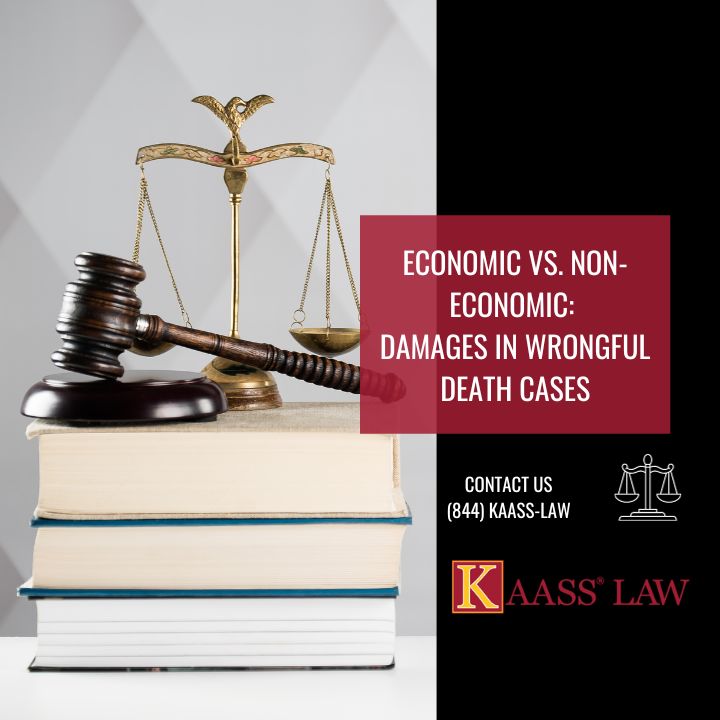Economic vs. Non-Economic cases may lead to different types of damages in your case. Cases involving wrongful death rank among the most difficult and technically challenging areas of the law. Pursuing a wrongful death lawsuit becomes essential when a loved one dies as a result of someone else’s carelessness or malicious behavior in order to obtain justice and financial compensation. Understanding the different sorts of damages that might be claimed is one of the key parts of these lawsuits. We will examine the two main types of damages in wrongful death cases in this blog post: Economic vs. Non-Economic losses.
Economic Damages to Compensate Surviving Family Members
Economic damages, also known as pecuniary damages, are tangible losses that can be quantified in monetary terms. These damages aim to compensate surviving family members for the financial losses they have incurred as a direct result of the wrongful death. Here are some common types of economic damages in wrongful death cases:
1. Medical Expenses
The medical costs associated with the occurrence when a person dies as a result of another party’s negligence are included in the economic damages. This covers the price of any hospitalization, surgery, medicine, or other medical care the dead received prior to passing away.
2. Funeral and Burial Expenses
Funeral and burial expenses can be substantial, consequently they are considered part of the economic damages. These costs encompass everything from the funeral service, casket, cemetery plot, and headstone. Moreover, family members have the option to seek compensation for these expenses, which can help alleviate the financial burden.
- Loss of Financial Support
A key economic harm in wrongful death instances is the loss of financial assistance. This involves estimating the income and financial contributions the deceased would have provided to their family over the course of their expected lifetime. In making this computation, we take into account the age, occupation, income potential, and life expectancy of the deceased.
- Loss of Benefits
The loss of benefits that the surviving family members would have gotten if the deceased had lived is also eligible for compensation. This could include any fringe benefits offered by the deceased’s workplace, such as health insurance, retirement benefits, and others.
- Property Damage
In some cases, wrongful death incidents may result in property damage, such as damage to a vehicle in a car accident. The cost of repairing or replacing damaged property is part of the economic damages.
Non-Economic Damages Endured by Surviving Family Members
Non-economic damages, nonetheless are less tangible than economic damages and intended to make up for the psychological and non-financial losses endured by surviving family members. These compensations recognize the psychological and emotional pain brought on by the tragic death. These are a few examples of typical non-economic damages:
Damages for pain and suffering are purposeful to make up for the mental anguish, grief, and emotional suffering that a family member’s death has caused. These damages acknowledge that a wrongful death has effects beyond monetary losses.
2. Loss of Companionship and Consortium
A person has a loss of companionship and consortium when they lose a spouse, parent, or child as a result of wrongful death. Furthermore, these compensations acknowledge the absence of emotional support, affection, and guidance from the deceased for their family members.
3. Mental Anguish and Emotional Distress
The impact a loved one may feel emotionally is devastating following their loved ones wrongful death. With this, non-economic damages can be rightfully compensated to the surviving family members as their grieve with mental anguish and emotional distress.
- Punitive Damages
In certain cases, the court may award punitive damages if the defendant’s actions were notably egregious or malicious. Punitive damages aim to penalize the offender and discourage others from committing similar acts. They are less common in wrongful death cases but can be significant when awarded.
- Loss of Enjoyment of Life
For a surviving family member, they may face long-term distress due to the wrongful death of their loved one. This may lead to a prolonged lack of enjoyment in their life towards fun times they are no longer able to experience.
Contact an Attorney Today
Wrongful death cases are emotionally challenging, and the pursuit of damages is a critical aspect of seeking justice for the deceased and their surviving family members. Understanding the distinction between Economic vs. Non-Economic damages is essential for both plaintiffs and their attorneys. While economic damages aim to address the financial impact of a wrongful death, non-economic damages acknowledge the emotional suffering and intangible losses experienced by the family.
Seeking guidance from seasoned legal experts is crucial when dealing with wrongful death cases. This ensures that all applicable damages are diligently in pursuit and that the entire process is approached with compassion and attentiveness. In the end, a triumphant wrongful death claim not only offers monetary support but also aids survivors in finding solace and ensuring that we hold those at fault accountable for their actions.
Accordingly, you are able to find out more information on other practice areas in our field we specialize in. Visit this link for more details.

